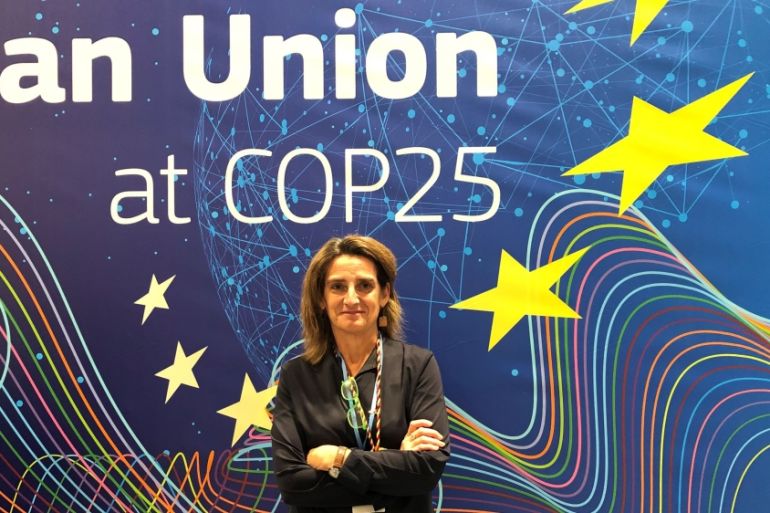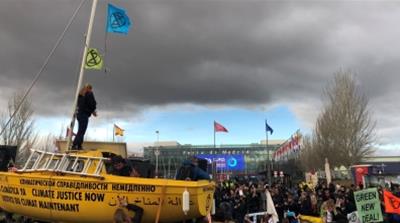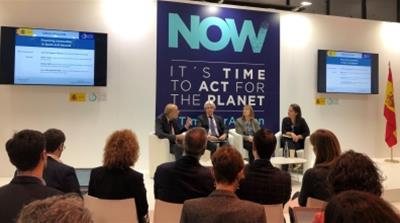‘Cleaner and cheaper’: Sunny Spain is banking on renewable energy
With productive solar and wind power, Madrid looks to Brussels and beyond for investment in climate projects.

Madrid, Spain – Although the outcome of the United Nations‘ COP25 climate conference negotiations may not shine for many observers, hospitable Spain welcomed the opportunity to spotlight its fast-tracked shift to renewable sources of energy.
The eco-friendly Socialist caretaker government eagerly pitched its environmental bona fides to tens of thousands who came as diplomats, investors and activists.
Keep reading
list of 3 itemsSpanish politics undermining global warming fight
As Trump walks away from climate pact, America’s Pledge steps up
With world attention on its green goals, the climate champions hoped to generate enhanced commitments to reduce emissions globally – and to finance electricity projects powered by the Spanish sun’s bright rays and the strength of the Iberian wind.
“We must make this transition. There is no other way,” said Jose Dominguez Abascal, Spain’s secretary of state for energy.
Speaking at a COP25 event on European climate finance for Spain, he said the country is becoming “much better in efficiency, electrification of transport and … the technology to make renewable electricity very cheap”.
“Today, producing with sun or wind in Spain is half the cost we have on the wholesale [electricity] market in Spain,” Dominguez said. “We need two things: money and to convince companies that the status quo must be modified.”
“We cannot keep investing in the same things we’ve invested in,” said the minister, referring to oil and gas companies placing bets on projects that risk becoming stranded assets.
‘Good path for renewables’
Maria Prado, a renewable energy transition campaigner at Greenpeace Spain, said that her country is still “extremely dependent on fossil fuels”.

At 74 percent of all energy use, Prado told Al Jazeera that Spain is “still 20 points above the average in Europe. Even though we’re on a good path for renewables, it’s still far away.”
Prado said the renewable energy industry is excited that the new government of Prime Minister Pedro Sanchez has been supportive of its growth, especially when viewed in light of the European Union‘s recent approval of decentralised electricity generation.
Now Madrid is pushing its citizens to become prosumers (producer-consumers), a change enabled by the recent repeal of the “sun tax” – a move that increased competitiveness and decreased electricity prices.
“This year we had 10,000 [solar] installations … but that’s so far away from Germany, Sweden and Denmark,” said Prado. “We have the privilege of being the country with the most sun in the Mediterranean.”
Meanwhile, Spain has a 2030 target for renewables to be 42 percent of all energy. SolarPower Europe says Spain will install more than four gigawatts (GW) of solar power systems this year. The wind sector also continues to grow quickly.
Ratification of Spain’s climate change law will likely accelerate the transition and create even more investor appetite for renewables.
‘Climate neutrality before 2050’
Spain currently has 28.5GW of renewables – 23.5GW of wind and 5.1GW of solar photovoltaic energy. An additional 62.9GW already has permits but is not operational, two-thirds of which is solar. Beyond that, 84.4GW has been requested by producers.

One gigawatt is the amount of power harnessed by three million solar panels or 412 utility-scale wind turbines.
The massive quantity of applications far exceeds the country’s expectations under the National Climate and Energy Plan for 2030.
“Spain is leading the country into achieving climate neutrality before 2050, fulfilling its international commitments in line with science and the calls for more ambition and robust climate action made by Spaniards in the streets,” says a pamphlet on the European Green Deal issued by the Ministry for the Ecological Transition.
“The government is planning to phase out coal and nuclear in the next 15 years, though that’s still too much for us,” said Mario Rodriguez Vargas, executive director of Greenpeace Spain.
“We will need money from the government and the EU to guarantee a just transition,” he told Al Jazeera, adding that the EU’s budget in this area will mostly focus on Eastern Europe.
“In the climate package released by the Spanish government just before the last general elections, practically 70 percent [of investment funds] come from the private sector,” said Rodriguez.
Minister for the Ecological Transition Teresa Ribera meets Spanish environmental leaders every few months, Rodriguez said, listening to their concerns.
“In 2007, [Greenpeace] were the first organisation in Spain, and Europe as a whole, that came out with a 100-percent renewable scenario by 2050,” he added. “And people then said we were crazy.”
‘Economies of scale’
Energy Secretary Dominguez, who works under Ribera, chaired a discussion on Wednesday with three speakers whose organisations – BNP Paribas, the European Investment Bank and Norway’s sovereign wealth fund – collectively advise on and lend $2 trillion.

The goal was to showcase how Spain can streamline financing for the development of its renewable sector.
“When we invest more money, we get economies of scale,” said Mark Lewis, global head of Sustainability Research at BNP Paribas Asset Management. “Things go faster than you can possibly imagine. There’s a feedback loop between public policy and technology.”
One of the main reasons for the initial success of the Paris agreement, he said, was that the cost of solar power came down from $400 to $120 per megawatt-hour – making it “so much easier for politicians to make the case, when the economics are on your side”.
He described renewables as “cleaner and cheaper”, making them an obvious investment. “You don’t have to look for energy, you don’t have to produce, you just have to make the infrastructure to capture it.”
The European Investment Bank (EIB), the EU’s 555-billion-euro ($617bn) lending arm, agreed last month to phase out fossil fuel investments by 2021.
Nancy Saich, the EIB’s chief climate change expert, said the focus was “not just about what we finance more of, but also about what we finance less of”.
To that end, she said the door is now shut for any new fossil-fuel projects.
“We did four billion euros [$4.4bn] of renewable investments last year, a large chunk of it in Spain,” Saich added. “I’m confident it’s a good investment.”
Norway’s $1.1 trillion sovereign wealth fund was instructed by parliament in June to divest billions from fossil fuels and open up to billions in renewables.
Lene Westgaard-Halle, a parliamentarian from Norway’s ruling Conservative Party, said that the new policy’s goal was “to make Europe cleaner and cut emissions, as well as for us to stay rich”.
“It’s a political decision,” she said, “but also financial. It’s important for us to make money.”
“This part of the oil fund that we invest in renewables is going to become bigger,” Westgaard-Halle added, with a nod towards the Spanish energy secretary. “It’s a mix of being an idealist and capitalist.”